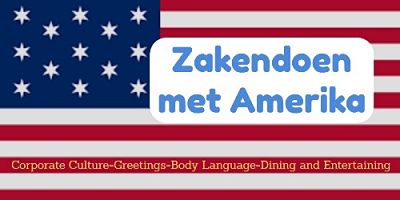Zakendoen met Amerika 22 TIPS voor succes
Tags: Beleefheidsvormen in het Engels, Gesprekken voeren, Engelse gesprekstechnieken, Internationaal zakendoen en cultuurkennis, Omgangsvormen, Zakelijk communiceren in het Engels
Succesvol zakendoen met Amerika
We kennen Amerikanen uit tv series, het nieuws en misschien van vakantie.
Over het algemeen zijn Amerikanen, hartelijk, duidelijk aanwezig, ontspannen, gastvrij en informeel in de omgang. Lees vooral verder!
Maar doe je zaken met Amerikanen dan is het goed om een aantal do’s and don’ts te kennen.
Tips voor zakendoen in de Verenigde staten komen je dus van pas.
We gaan je in dit artikel laten zien wat je moet weten over zakendoen met de United States of America.
Welke intermenselijke cultuurverschillen er zijn maar ook over de Amerikaanse organisatie cultuur.
In een filmpje even verderop vertelt Guus Bakker hoe snel het kan gaan als je zaken doet in Amerika.
Ook hebben we als bonus een uitgebreid E-book over cultuurverschillen in de Verenigde Staten met daarin ook alles over export naar US.
Lees dus vooral verder!
Amerikanen hebben hun eigen zakelijke cultuur. Het is heel anders zakendoen met Britten of zakendoen met Canadezen, ook al is er een gemeenschappelijke taal.
- Puntsgewijs een aantal dingen waar je op moet letten als je zaken doet met Amerika.
Verderop in het artikel gaan we er (in het Engels) wat uitgebreider op in.
“After all, the chief business of the American people is business. They are profoundly concerned with producing, buying, selling, investing and prospering in the world. I am strongly of the opinion that the great majority of people will always find these the moving impulses of our life.”
Calvin Coolidge 30th President of the United States
Zakendoen met de Verenigde Staten: waar moet je op letten?
22 punten:
- Amerikanen zijn informeel en jovialer dan Nederlanders
- Small talk (beginnen over ‘koetjes en kalfjes’) schept een band
- Time is money
- Ze willen het maximale uit hun contacten halen
- Amerikanen zijn ‘to the point’
- Verwachten dat jij goed Engels spreekt
- Voornamen worden al snel gebruikt. Wacht tot jij getutoyeerd wordt
- Interesse in persoonlijke omstandigheden wordt gewaardeerd
- Opbouwen van het contact is belangrijk: mee uit nemen voor diners, wedstrijden enz.
- Een snelle informele ‘deal’? Juich pas als het op papier staat
- Amerikanen werken lange dagen en hebben weinig vakantie. Begin niet over je 4 weken vakantie
- Stilte in een gesprek, even nadenken? Blijf praten voordat men denkt dat je het niet eens bent
- Verkoop jezelf! Resultaten tellen, bescheidenheid kent men niet
- Amerikanen gaan meer voor afspraken op de korte- dan de lange termijn
- Zakendoen gaat op basis van harde cijfers en onderbouwing (onderhandelen in het Engels)
- Humor kan goed werken maar niet over Amerikanen zelf, religie en politiek
- Men verwacht jouw visitekaartje direct en geef ze aan alle aanwezigen
- Iedereen mag zijn mening geven maar de ‘baas’ beslist, ons poldermodel kent met niet
- Heb je een kantoor in de US dan heb je een streepje voor en ziet men je serieuzer
- Informele contacten in bedrijven zijn belangrijk maar er is een duidelijke hiërarchie
- Sommige onderwerpen liggen héél gevoelig. Weet welke dat zijn en zorg dat je daar niet over begint
- Netwerken wordt als heel belangrijk gezien. ‘Aan wie kan je mij nog meer voostellen’
Zakendoen met Amerika: Guus Bakker vertelt hoe snel het kan gaan
Doing Business in the US
Corporate Culture
Generally speaking , in the United States the working week is Monday to Friday. However, due to a strong work ethic the majority of Americans work long hours and overtime is common practice.
Negotiations and final decisions in the US are frequently made by one person who has chief authority. Team negotiations are rarely carried out.
Office hierarchy within the company is extremely important. Therefore it is advised to learn the rank and titles of all members of the organization.
Americans often take a “business –first “approach, with personal relationships playing a smaller role than in many other cultures. They are are direct and “yes “means yes, and “no” means no.
Americans are very assertive and expect you to be also, it is seen as a weakness if you are shy or modest. “We are the best “ best describes their attitude.
Americans are seen as loud and pushy by many other cultures.
They expect you to be positive about yourself, your products and your capabilities. Never downplay the capabilities of a product or service as this can be seen as evidence of poor quality.
Americans expect you to ask questions if you don’t understand something .
They value numbers and using figures and statistics to support your position will help you persuade them.
Getting down to Business
Americans believe the goal of business negotiations is to arrive at a signed agreement.
They “mean business “and will move as fast as possible to get there. Keep appointments.
You may not get a second chance .
Always be on time for appointments. Americans view someone being late as rude. Being on time means being about five minutes early for an appointment.
Meetings are usually informal but serious in content. Often the agenda will be distributed before the meeting, so that participants can prepare.
The exchange of business cards is a casual affair. They regard business cards as a resource for future information.
Americans are uncomfortable with silences.
It is very important to meet deadlines. If you tell someone you will have for example, a contract ready for a certain date, then do.
It is considered rude to interrupt someone when talking. Say , “Excuse me”.
Do not enter any contract without having a lawyer. No savvy business person would sign a contract without informing a lawyer.
BONUS-BONUS-BONUS
Met dank aan Global Business Culture een uitgebreid E-book over zakendoen met Amerika.
Greetings
In business situations, shaking hands is the accepted way of greeting. In some situations Americans don’t shake hands at all. The handshake should be firm and brief.
Address your American colleagues with a title such as “Dr”,”Mrs”,” Ms” or “Mr.” Your American counterparts will insist on using first names almost immediately; this isn’t a sign of familiarity but simply reflects the casual business style.
Eye contact is important. You should always stand when greeting someone.
The greeting is usually informal . “Hi ”or “How are you” are used even in business situations.
“How are you” is not a query about your health, it is a simple greeting. In other English speaking cultures the first greeting is “Nice to meet you “and” how are you” is not enquiring about your health. So when an American asks “How are you” don’t answer , “I don’t feel very well today, I’ve got a terrible headache”.
When saying good-bye, Americans may say, “We will have to get together “or “Let’s do lunch”. This is not an invitation unless you get time and date. It is usual to say, “See you later” even if you never see the person again. Say ”please” and “thank you”, and “sorry” as Americans expect you to be polite.
Body Language
Don’t stand too close. Keep a reasonable space between you and the other person as Americans feel uncomfortable if you stand too close. It is better not to touch someone unless you are sure the other person is ok with it.
Americans smile a lot, even at strangers.
Don’t be offended if your American colleague doesn’t accept a gift. Gifts giving is often discouraged or limited in many US companies.
Dining and Entertaining
Business could be conducted over breakfast, lunch or dinner. The person extending the invitation pays for the meal. A guest of honor is often toasted and should reciprocate by saying thanks.
Start with the fork in the left hand and the knife in the right hand to cut the meat. The fork is then transferred to the right hand and used as a scoop to eat the food. Your serviette should be placed on your lap and kept there throughout the dinner.
Never begin eating before everyone is served and your host has begun. Offer food and drink to others first. Serve all women at the table first. Feel free to take a second helping of food. Americans eat more quickly than people from other countries. The point is to eat and not to socialize.
If invited to a person’s home it is usual to bring a small gift. There are no taboos as in many other countries. A gift from your country would be appreciated . Flowers, chocolates of a book are also suitable gifts. If invited for dinner to a person’s home, never arrive before the time of the invitation. 5 or 10 minutes late is usual.
Cash gifts are not appropriate.
- Hier lees je nog meer over een goed zakelijk gesprek in het Engels voeren
- We schreven eerder een artikel over internationaal zakendoen en het verschil tussen Brits en Amerikaans Engels, misschien ook goed om te lezen.
- Mis dit artikel niet waarin we 13 Engelse woordenlijsten met Business English termen voor je hebben.
Veel succes met het zakendoen in de Verenigde Staten!
Ken je andere die geïnteresseerd zijn in dit artikel dan wordt delen gewaardeerd. Bedankt.



